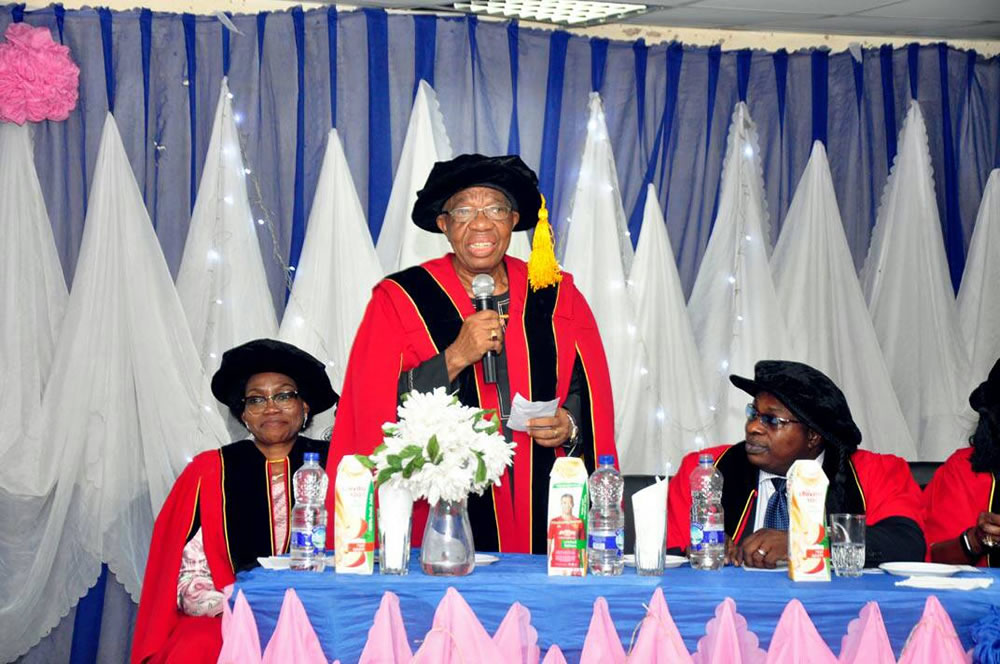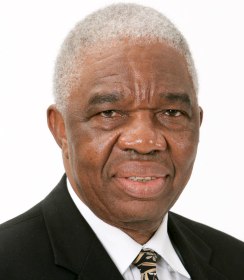
 Aremo (Professor) Gabriel Babatunde Ogunmola is retired professor of Chemistry and Chancellor of Lead City University, a former president of the Nigerian Academy of Science. He was Dean of the Faculty of Science of the University of Ibadan and today remains a celebrated scientist globally. He is equally from the Torungbuwa Akarigbo Ruling House of Sagamu, Remo land in Ogun State. In this interview by KEHINDE OYETIMI, he speaks, inter alia, about the development of Remo land, the expectations of the people from the next Akarigbo to be installed.
Aremo (Professor) Gabriel Babatunde Ogunmola is retired professor of Chemistry and Chancellor of Lead City University, a former president of the Nigerian Academy of Science. He was Dean of the Faculty of Science of the University of Ibadan and today remains a celebrated scientist globally. He is equally from the Torungbuwa Akarigbo Ruling House of Sagamu, Remo land in Ogun State. In this interview by KEHINDE OYETIMI, he speaks, inter alia, about the development of Remo land, the expectations of the people from the next Akarigbo to be installed.
What would you tie to Remo’s historical development?
Remo is a community that is primordial. When you talk of the Yoruba race, history will tell you that the origin of the Yoruba people is Ife. When you talk to the Ooni of Ife, he will tell you that the origin of the world is Ife. We all believe that Ife is our ancestral root. The Remo people came from the Iremo quarters of Ife. Different groups migrated from Ife to different parts of the Yoruba country. They walked through the virgin land to build new communities; there was no railway and they were moving until we eventually got to where we are located now as Remo people. The migration story had it that we went through different place and came through Ijebu Ode, Okun Owa and Orile- offin. We moved in packets of different groups and we all got to the same place in Remo.
What are those ingredients that formed the traditional and political outlook of Remo?
We have our own style of governance. It is the people that make a community. Different people expand the family size and the community expands. Remo, from history, was traditionally made up of 33 federated towns. Today, they are more than that. The evolution of new towns has expanded the 33 to almost 45. Each of them has their own governance structure. There is an Oba, a judiciary system and our method of putting in place law and order. That is what we call the traditional governance. They all have their economies and their technologies for a productive life based on agriculture.
But what colonialism did for us was to hamper the development of our own traditional governance to enhance who we are. There is need for a search for going back to look for where we came from for the improvement of our original concept of governance. We already had a democracy even in the traditional style of governance of our people. We stopped our expansion of our thinking process; we became confused because we stopped growing in our creative worldview. This is what traditional governance must revisit and re-energise and then be able to improve through education and service with whatever civilisation that the Western thinking has brought to us to be creative. What we can call a union of civilisations, an improvement of our civilisation for the well-being of the people for a productive living in harmony and peace.
How effective are the efforts put in place to get back what got lost?
You can see every community talk about building their culture. Our culture is more than just for tourism. Our culture is rebuilding who we are and our worldview. We must start thinking who we are, ab initio. What were our aspirations as a people? What do we aspire to be? If you say that the world started from us as African and we are the founding race, of course we must have aspiration to be the best, we must all contribute to our collective improvement. Even the western democratic process was an evolution of how people came together to understand themselves of building a community. What do you achieve by building a community? Shouldn’t it be the improvement of the human race? After all we all came in here and the big search question is who are we and why are we here to fulfil our destiny as a community and as a nation.
In your preface to the book Obafemi Awolowo and the Making of Remo: The Local Politics of the Nigerian Nationalist, you claim that if federalism has a primordial root, Remo is one place to look for it. Would you say that Remo had an exclusive preserve of such practice or it was widespread then?
They were faced with difficulties; there were inter-clan wars and they were in small groups. They needed something they could do to live in safety rather than living in separate enclaves. They wanted to come together to live as a federated community with each of the communities maintaining their identity but working together as a larger whole. We federated but each still had their own traditional ruler and system of government. We then decided to come together under a ruler, the Akarigbo of Remo who has paramountcy over others. This is what we have been aspiring to in Nigeria. There are different groups: the Yoruba, the Ibo, the Efik and so on. But it is expedient from what I refer to as the primordial for us to form a federated union which is that you still remain yourself.
You equally said that Remo can be regarded as the political laboratory that formed the crucible of Awolowo’s political career and the drive he gave for federalism. If it was able to work in Remo, why has it been difficult to replicate such in the larger Nigerian society?
It is simply because we have not learnt from it. The real building of knowledge and skill is learning. You then improve on knowledge and you go to higher levels of achievement. When this crucible experience formed his growth and thinking, of course, he ended up practising it at the regional level. That was why his regional experience was a success. But we practised regionalism that for a short time true federalism and then demolished it. Regional governance in a federated nation was one of our most glorious periods.
In a federal system, you share powers. These powers belong to the people. The people at the local level have their own governance, way of life, culture and strength. They use their strength to produce and to advance their cause and then you find another group of people with peculiar evolution. This then brings in diversity. We then tap on the strengths of the different groups. We then ask by coming together on how do we want to relate together and work for the greater good of the whole. Which powers do we want to surrender to the centre for the greater good of the whole while the federating units flourish? Not that you micromanage the federating unit to the level that is unproductive. When the experience of the Western region was in place, education was concurrent which means the Federal Government could carry out education policy, the region could carry out its own education. And uniquely, the Western Region saw that there was no way that development would be achieved if the people were not educated. And they went for it. But could the people afford the education? The limitation to education at that time was access and fund. The government then removed the bottleneck and said that government would make education free and that it would pay for it. Look at the effect today. There is nowhere you go to all over the world where you won’t find Nigerians who benefitted from that scheme. It snowballed. The Federal Government then saw it and that gave birth to the Universal Basic Education (UBE). That is the strength in federalism. What we are looking for is the strength of the federating component. It is not how to control the resources of the federating unit.
Not many traditional stools in Yoruba land have such strong presence as what we see today in the Akarigbo stool. How would you describe the stool of the Akarigbo and the power that it has?
The Akarigbo stool has paramountcy in Remo. The seat is in Sagamu and each of the 33 or 45 towns there are now has their own oba and governance structure. But they all work together. There is the Remo traditional council of which the Akarigbo chairs. Akarigbo’s chiefs are those of his immediate constituency. That is a beautiful arrangement because they come together and develop a larger community; they create a larger market and a larger infrastructure. They can improve on the capacity of the people collaborate and partner with government at all level to bring development to the people, banish poverty and bring employment to the youth.
Haven’t there been moments where wrangling undermined or threatened the power of the Akarigbo?
Today, no oba or community in Remo has inflicted anything on the paramountcy of the Akarigbo in Remoland. An Akarigbo himself recognises the leadership of each community within the larger communities. For example, any issue that comes from, for instance Iperu, the Akarigbo consult the Alaperu who is the traditional ruler of Iperu. The Alaperu is responsible for what comes out from Iperu. The Alaperu and the Akarigbo would combine strengths and resources whenever it is necessary, especially in improving Iperu and the entire Remoland and so also with other towns within the federated community.
Remo has no Akarigbo at the moment. What are the processes to ensure the smooth installation of a new one?
The process is very simple. There are about five ruling houses. Each ruling house has a head of the family. It is the head of the family that would call for a family meeting where nomination would be made as to who would be chosen to represent that ruling house. As far back as the fifties, the government had put in place a rotational order that would go round the ruling houses. The last ruling house was Liyangu our own Mama Chief (Mrs.) Awolowo was the head of that family. The next house to be called upon is the Torungbuwa as laid down in the official government gazette. There shouldn’t be any problem. The Sagamu Local Government is the competent council which calls on the ruling house to call a meeting of all stakeholders for a selection process of candidate or candidates to be selected and sent to the Kingmakers who would make the final selection of an Akarigbo Elect. The Governor of Ogun State, Senator Ibikunle Amosun would then give the staff of office to the New Akarigbo.
How much can you say that Remo sons and daughters in the Diaspora have contributed to the development of that stool and of their land?
A lot has been contributed our people are very sensitive to their community and responsibility to it. They are monitoring what is going on all the time. What we need now is a mobilising leadership. The potential for development is there. People need a leader they can trust and i can assure you that they are ready to contribute to the development of their community through self help and in partnership and cooperation with different levels of government. A Bayo Ogunlesi is on Trump’s economic team. He is from Sagamu. He is a Remo son. It is Bayo Ogunlesi and others who are part of the economy from the Wall Street. Bayo is not a politician. He is neither a republican nor democrat. He is just a professional. If you then have a leadership in an Akarigbo that would woo and recognise a Bayo Ogunlesi and tell him that ‘Bayo, you are a son of Remo land and also an expert in infrastructure, we have plans to develop Remo. We need your help.’ I can assure you that he would say yes and so many sons and daughters of Remo in different areas of the economy across the world would respond with ‘same yes’ to a trusted leadership in an Akarigbo.
What are you expecting from the next Akarigbo to accomplish?
What are the expectations of leadership in the next Akarigbo? Maturity is needed; commitment is needed to the people; cooperation and partnership with government in the development of the people and their communities. The people are therefore waiting to be helped. They want to improve their lives. They want to see their children better than themselves. They want to see their children put high-rise buildings in Remo. They want to develop farms, factories, and their cities with modernity.
When Chief Awolowo executed free primary education programme so that our children could go to school, he was expecting that the products of the free primary education programme would fund the next generation development of their community and the nation. We must all be committed to develop the nation, from our communities and we in Remo must do so without leaving anyone behind.






